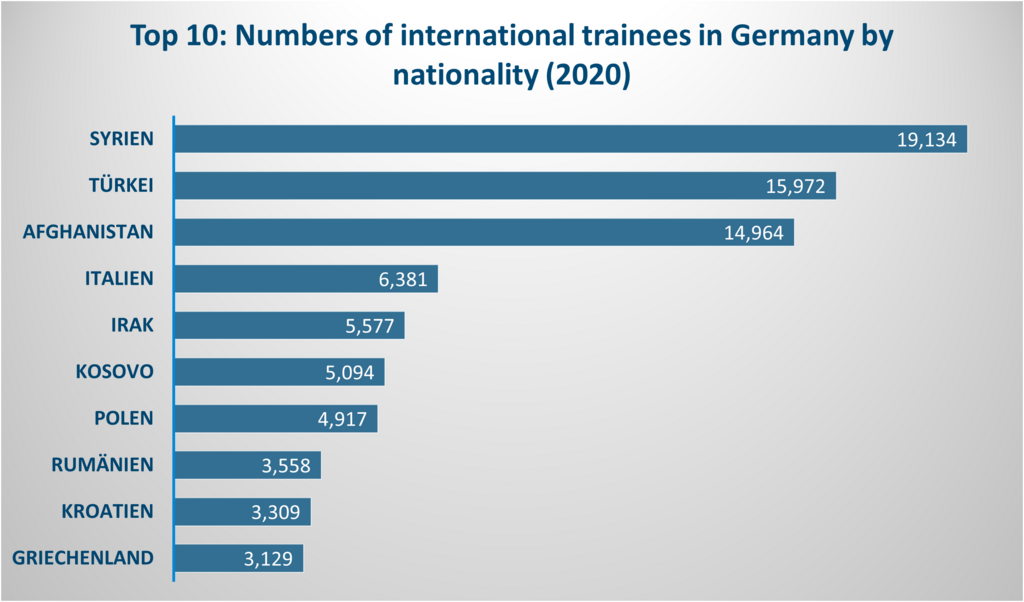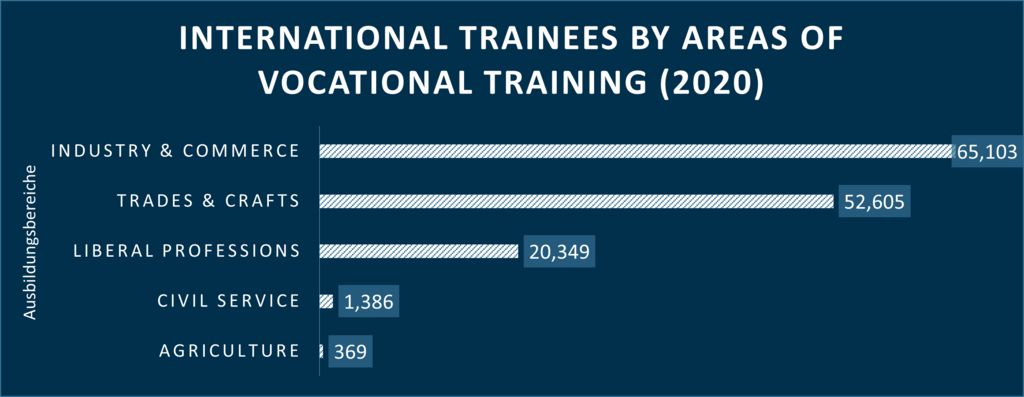![[Translate to English:] ©GettyImages/Echo [Translate to English:] Auszubildender in Deutschland](/fileadmin/1_Rebrush_2022/Newsletter/03-2020/2.2.5.1_Echo_GI.jpg)
Training opportunities for prospective trainees from abroad
30/06/2022: The current shortages in the labour market are also being felt in the training market. Due to a lack of applicants, many apprenticeship vacancies go unfilled in certain sectors. Reason enough to look for potential apprentices abroad. The following article describes the potential offered by prospective apprentices from abroad, and how they can be recruited for the German training market.
Trainees are in high demand in Germany
The German system of dual vocational education and training is very varied. From the very beginning, apprentices not only learn theory at vocational school, but also spend around two-thirds of their training period working in a company. This system enables trainees to earn their own money during their apprenticeship, and gives them valuable insights into the practical work environment. Once they are fully qualified, many apprentices remain with their training company as skilled workers. Others manage to find a job with another company.
In spite of these advantages, companies are finding it increasingly difficult to fill all their apprenticeship vacancies, as current data shows [1] : the number of unfilled apprenticeship positions has been rising steadily for years, totalling around 63,000 as of 20 September 2021 – an increase of 5.4 per cent compared to the previous year [2] .
As in recent years, the relative share of unfilled apprenticeship vacancies was highest in the skilled trades and crafts (16.4 per cent). According to the Federal Employment Agency, training occupations that are facing great difficulties in filling vacancies include vocations in artisanal food production, orthopaedic and rehabilitation technology, and metal construction. In absolute terms, the majority of unfilled apprenticeship positions (36,000) fell within the remit of the chambers of commerce and industry (IHK). The hotel and catering industry, the heavy goods vehicle sector and the sales industry also experienced above-average difficulties in filling apprenticeships.
Trainees of foreign origin: a large pool of potential applicants for training companies to tap into
To help counter the problem of filling vacancies in the vocational training market, many training companies have begun to recruit trainees of foreign origin. In this context, the group of immigrants already resident in Germany provides a large pool of potential applicants. At the end of 2020, for example, some 140,829 trainees in Germany had a foreign passport [3]. As shown in Figure 1, nationals of Syria (19,134), Afghanistan (14,964) and Iraq (5,577) accounted for almost 30 per cent of international trainees. This can be explained in part by the sharp increase in the number of newly arrived refugees at school and training age in 2015 and 2016. Besides Turkey, which ranked second, EU Member States such as Italy (6,381), Poland (4,917), Romania (3,558), Croatia (3,309) and Greece (3,129) were also a major source of prospective trainees.

Source: Federal Statistical Office of Germany [Statistisches Bundesamt], 2020, authors’ design
A breakdown by areas of vocational training shows that international apprentices are often engaged in sectors experiencing major problems in filling apprenticeship positions. Figure 2 shows the key areas of vocational training in which international apprentices were employed in 2020. Commerce and industry (IHK) occupations came first, with more than 65,000 apprentices, followed by the skilled trades and crafts, with almost 53,000 apprentices. Since these areas have the most unfilled apprenticeship vacancies in absolute terms (IHK) or in relative terms (chambers of crafts, HWK), international apprentices help to fill gaps in the training market and reduce the problem of filling vacancies.

Figure 2; source: Federal Statistical Office of Germany [Statistisches Bundesamt], 2020, authors’ design
What to consider when recruiting trainees from abroad
Several aspects need to be considered when employing international trainees, which may differ from the case of employing German apprentices.
School-leaving certificate: Whether a specific qualification is required for vocational education and training (VET) varies depending on the type of training. In the case of dual VET, the professional requirements are stipulated by the training company. For admission to school-based VET, most vocational schools require applicants to have a school-leaving certificate. This is regulated under federal or state law. If an applicant obtained their school-leaving certificate outside Germany, it may be necessary to have the certificate formally recognised. The certificate recognition bodies of the individual federal states are responsible for the recognition of school-leaving certificates. You will find the competent body on the information portal anabin . Training companies can also use this tool to find out about various school-leaving qualifications obtained abroad. In addition, the BQ portal offers information on foreign education systems. These details enable employers and training institutions in Germany to assess the school careers of foreign applicants themselves.
Language skills: There is no general rule regarding the level of German required for admission to vocational education and training in Germany. Language requirements are determined by the training company or training institution. Before starting their training, foreign applicants can start learning German in their countries of origin. However, these skills will usually not be sufficient for them to successfully complete their VET. For this reason, training companies should give their trainees the opportunity to attend further language courses. Before starting their vocational training, non-German speakers can apply to attend one of the vocational language courses offered by the Federal Office for Migration and Refugees (BAMF) , for instance. The vhs learning portal also offers free online courses.
Visa regulations: Different visa regulations apply depending on the countries of origin of the prospective trainees from abroad. Nationals of an EU or EFTA [4] Member State can start vocational education and training in Germany without having to comply with residence regulations. They do not need a visa or a residence permit to stay in Germany and start the training. All that is needed to enter Germany is a valid identification card. As soon as a specific training place becomes available, the applicant can start their training without the need for any further formalities.
Applicants from third countries must apply to the German diplomatic mission in their country to obtain a visa for vocational training (Section 16a of the Residence Act (AufenthG)). To do this, the following basic requirements must be met:
- A specific vocational training place must be available.
- The applicant must have the language level required to complete vocational education and training. Applicants are generally required to have a sufficient knowledge of the German language (Level B1 of the Common European Framework of Reference for Languages (CEFR)) before they can embark on VET. Applicants are required to provide supporting documents if the language skills required for their specific qualified training have not been tested by the educational institution or are not to be acquired by attending a preparatory German language course.
- Applicants must be able to cover their living costs for the entire length of the vocational training. As a rule, applicants must provide evidence of having at least €832 per month at their disposal (as of 2022). If the applicant receives an apprenticeship wage, this serves as proof if it exceeds €909 (gross) per month. If accommodation or meals are provided free of charge, lower amounts apply [5]. If the applicant intends to pursue school-based VET without an apprenticeship wage, they may opt to submit a declaration of commitment signed by a third person.
As of 30 June 2021, a good 29,000 third-country nationals were present in Germany with a residence permit for vocational training. Of those, 4,097 were issued for the first time in the first half of 2021 [6] .
After completing the training: prospects in Germany
After completing their training, fully fledged trainees have a variety of options open to them. Qualified trainees who have completed a recognised apprenticeship, i.e. VET in a state-recognised profession or a comparable regulated profession lasting at least two years, are permitted to work in their profession without any restrictions. Given that they obtained their qualification in Germany, the qualification does not need to be recognised. Many companies take on their trainees once they have completed their training. Qualified trainees wishing to continue to be employed as skilled workers require a residence permit to take up employment (Section 18a AufenthG) if they previously had a residence permit for vocational training (Section 16a AufenthG) and are not nationals of an EU or EFTA Member State. Qualified apprentices can have their residence status changed immediately after completing their training in Germany. To do this, they must apply to the competent Foreigners Authority.
Another option open to qualified trainees is to follow up their apprenticeship with continuing vocational training in the field in which they trained, enabling them to specialise further. Qualified professionals in skilled trades and crafts can undertake advanced vocational training to become master craftspersons. Those who complete high-level VET programmes are more likely to work in management positions or set up their own businesses.
Qualified trainees can also go on to study higher education. As a rule, qualified trainees with three years of professional experience are eligible to enter higher education to study a subject related to their profession. Holders of a German master craftsperson qualification or other high-level VET certificates are often automatically eligible for entry to higher education, meaning that they have a free choice of subject. Depending on the country of origin and its education system, a school-leaving certificate obtained abroad may also entitle the holder to access higher education (for more information, visit the Anabin portal )
More information on the portal
Quick check for employers
Section on “Targeted recruitment”
Instructions “Publish your job advertisement on Make it in Germany”
[1] Jansen, Anika / Hickmann, Helen / Werner, Dirk, 2022, Steigendes Ausbildungsangebot in Berufen mit langjährigem Fachkräftemangel, IW-Kurzbericht, Nr. 41, Köln
[2] Bundesagentur für Arbeit, 2021, Situation auf dem Ausbildungsmarkt – Berichte: Arbeitsmarkt Kompakt- Oktober 2021,
Bellmann et al., 2021, Der Mangel an Bewerbungen bremst die Erholung am Ausbildungsmarkt, in: IAB-Forum
[3] Statistisches Bundesamt, Datenbank der Berufsbildungsstatistik
[4] The European Free Trade Association (EFTA) is an international organisation currently comprising four countries: Iceland, Liechtenstein, Norway and Switzerland. EFTA’s main objective is to promote free trade between its Member States and with the EU.
[5] See also Section 2.3.2.6 of the Notes on the application of the Skilled Immigration Act of 6 August 2021.
[6] BAMF, 2022, Monitoring zur Bildungs- und Erwerbsmigration: ein Bericht für das erste Halbjahr 2021
Do you have any questions?
Let us advise you on your opportunities to work and live in Germany. Our experts will support you with questions regarding job search, visa, recognition and learning German.
You can find out more about the various contact options by clicking on one of the icons in the bar below.
